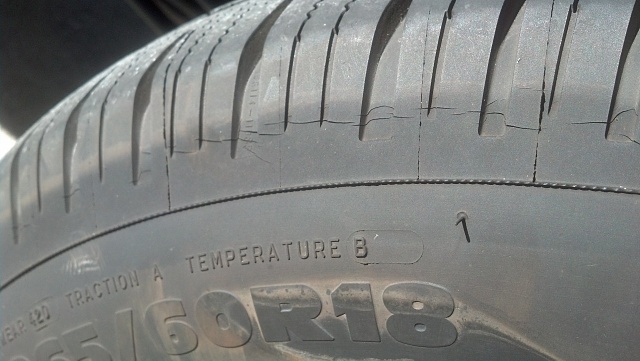Most of my Michelins get those cracks. But that is tangential to the fact that they outlast and outperform any other tire I've had. In other words, they get cracks but that seems to not hurt anything. Yeah I'm not sure what to think on the danger aspect. Some authorities say replace, some say don't worry about it. Roadside Flat Tire Assistance is available 24 hours a day, 365 days a year in the U.S. And Canada for 3 years after you purchase your MICHELIN replacement tires. In the event you need roadside assistance, simply call 1-888-553-4327 (also provided on the tear-out wallet card), and a qualified service professional will provide assistance.


Michelin Tire Cracking Guide
- Over the past 5 years Michelin has had issues with cracking. We've never received any explanation from them as to a cause, and we, as a Michelin dealer, have replaced quite a few tires under warranty because of it. Personally, I would contact Michelin North America and explain your case to them.
- Hey guys, I have a set of Michelin LTX tires that still have over 10/32' of tread left on them and the sidewalls are cracking. Its only on the outside sidewall, a couple are getting deep looking. They are load range E. I've heard that Michelins are known for doing this and it poses no real.
- Put another way, cracking of rubber is to be expected as the tire gets old. But the real problem is not what you can see on the outside. It’s the rubber on the inside that’s holding the tire together.

Considering that a new set of high-performance Michelin rubber costs more than $2,000, both C7 Corvette owners and enthusiasts wondered if dealers will replace the damaged tires free of charge. Fortunately though, Michelin’s lead engineer for the C7 Corvette Lee Willard issued the following statement to CorvetteForum.com:
“This winter has been extremely harsh in much of the country and some recently shipped Corvette tires may exhibit cracking. In general, summer tires should never be driven on or moved in temperatures under 20°F because they may crack. Tires should be carefully inspected at the dealership before taking delivery of a vehicle.” declared Willard.
“Never use a tire with freeze cracks, breaks, or damage to the sidewall or tread. For those residing in colder climates, Corvette owners should have a plan for vehicle storage during cold winter months. If your garage drops below 20°F regularly, consider removing tires and storing them inside. If you live in colder climates and want to drive your vehicle in temperatures below 40°F we strongly recommend investing in a set of winter or all-season tires.” he added.
As things stand now, Michelin is right - it’s not their fault that the tires on brand spanking new C7 Corvette Stingrays and Z06s were cracked, but General Motors'. It’s the carmaker’s duty to ship new cars from assembly plant to dealer in perfect conditions, including temperature. Let’s keep those fingers crossed General Motors will man up and replace the cracked tires at no cost to the owners in the near future.


Michelin Tire Cracking Warranty
Tires take a serious beating—constant 'stretching' as they roll along the road, exposure to harsh chemicals (gasoline, oil, acid, etc.), UV rays and heat. That rubber is suffering so that you can travel! Almost all tires will begin to exhibit small cracks in the sidewall after a short period of time. Is it time to worry?
The outer layer of rubber on the sidewall is simply a sealing layer to keep the elements away from the inner (structural) part of the tire—in other words, those unsightly cracks are purely cosmetic. If your tires start to get really deep cracks after 3-5 years, you might consider replacing them for peace of mind. If you haven't worn out a set of tires in 5-8 years, it's worth replacing them for safety's sake, even if there is still good tread left on the tires.
It is important to note that recreational vehicles—like your VW camper, maybe?—are more subject to tire cracking than everyday drivers. Long periods of 'sitting' causes the rubber to dry out, and when you take your camper out for a drive, the rubber 'splits' as it gets worked on the road. Again, this is nothing to worry about unless the cracks are exceptionally deep.
The bottom line is this: In almost every case we've seen, you do not need to worry—you just need to get out and camp!